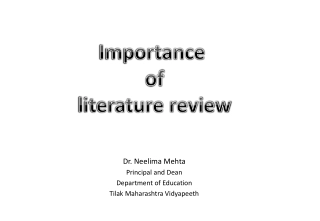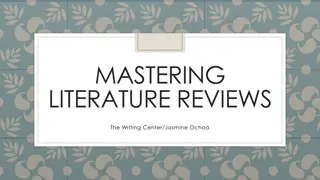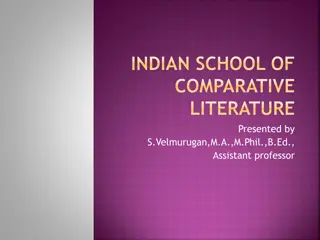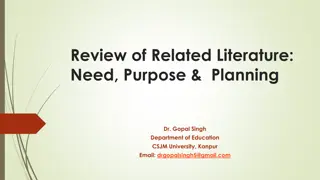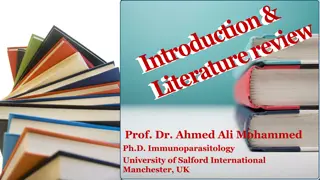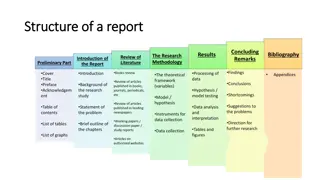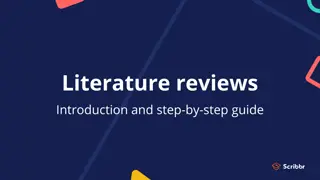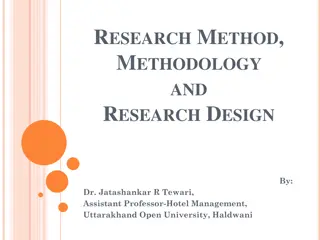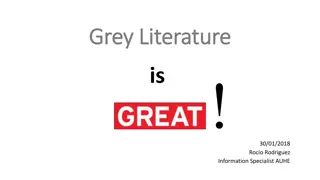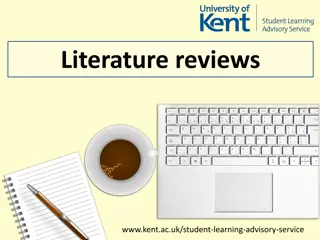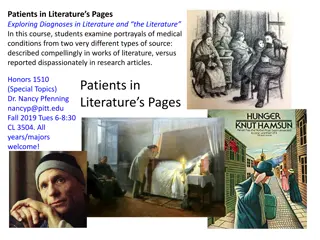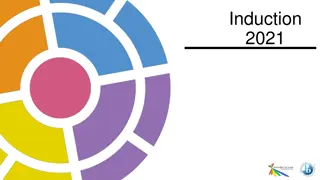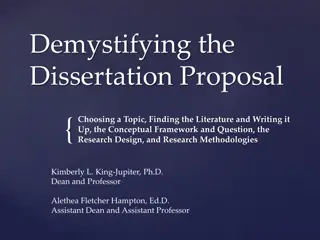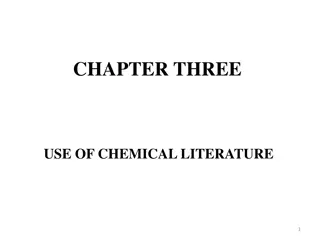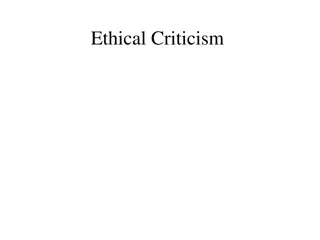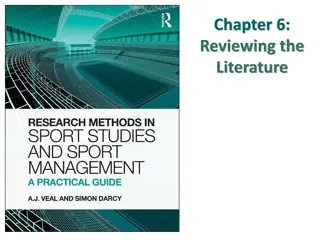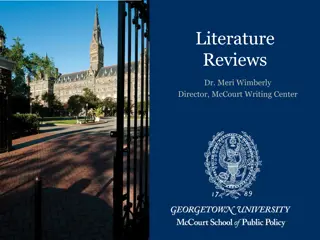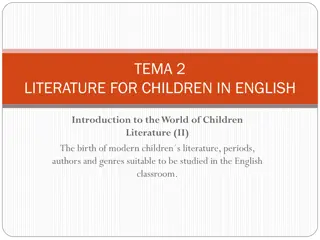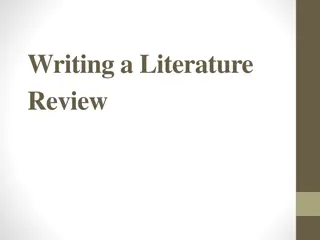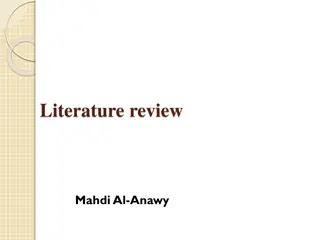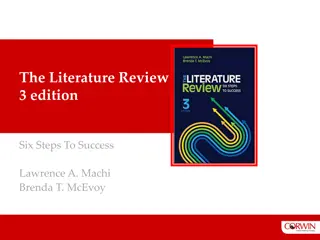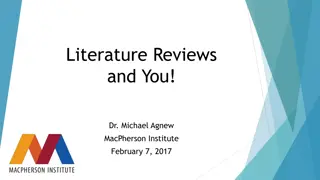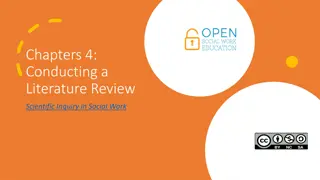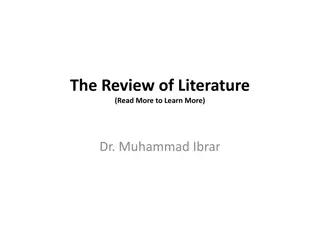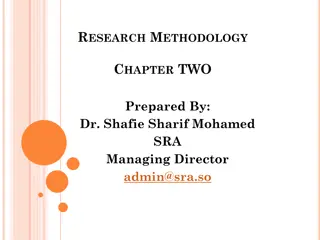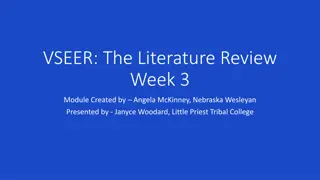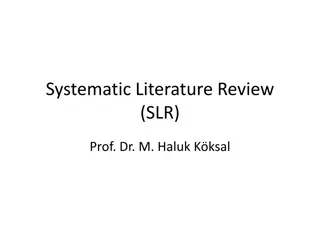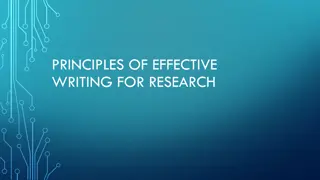Importance of literature review
A literature review is a critical component of any research endeavor, providing a comprehensive analysis of existing knowledge in a particular field. This review helps in clarifying conceptual issues, understanding research design, persuading examiners, and contributing new insights to the subject a
0 views • 28 slides
LITERATURE REVIEW
Reviewing literature is a crucial aspect of research projects, allowing for a theoretical foundation and connection to practical applications. Steps involved include sourcing, careful reading, note-taking, theme identification, drafting, and revising. Discussions with colleagues can enhance the unde
2 views • 13 slides
Mastering Literature Reviews: A Comprehensive Guide for Writing Success
A literature review is a critical discussion of relevant information on a specific topic, involving problem definition, interpretation, and identification of research gaps. It is not a mere collection of sources but a synthesis that guides further investigation. Incorporating APA style tips, this gu
1 views • 15 slides
Insights into the Indian School of Comparative Literature: A Comprehensive Overview
The Indian School of Comparative Literature, pioneered by Dr. Buddhadeva Bose in 1956 at Jadavpur University, plays a crucial role in studying the diverse languages and rich literary traditions of India. This academic discipline has grown significantly, with a focus on French symbolist poetry's infl
2 views • 14 slides
Effective Strategies for Literature Searches and Re-Use of Scholarly Literature
Conducting literature searches involves surveying existing publications and information on a specific topic. Different search strategies, from simple searches to systematic queries and snowballing, are utilized based on research needs. Learning objectives include building search strategies, using ad
2 views • 19 slides
Introduction to Isixhosa Language and Literature - Exploring Characters and Themes
This content provides an overview of Isixhosa as a first additional language (FAL) and delves into key aspects of literature such as character development and themes. It discusses the importance of characters in storytelling, emphasizing the significance of round and flat characters. The article als
3 views • 28 slides
Understanding Literature Reviews: Process, Purpose, and Types
A literature review is an essential part of academic research, providing a synthesis of existing studies on a topic. It involves reviewing published information within a specific subject area to help the reader understand the research background. The process of conducting a literature review is meti
0 views • 70 slides
Comprehensive Guidelines for Research Proposal Writing
This guide covers the initial project pitch, literature review importance, and reasons for conducting a thorough literature review. It emphasizes the significance of familiarizing oneself with existing knowledge and theories in the field to establish a strong foundation for one's research. The conte
0 views • 17 slides
Understanding the Structure of Research Reports
A research report consists of several key sections such as the preliminary part, introduction, literature review, methodology, data analysis, results, conclusions, and bibliography. The preliminary part includes components like cover, title, preface, acknowledgement, table of contents, list of table
0 views • 8 slides
Comprehensive Literature Review Guidelines for Your Dissertation
Discover expert guidelines for conducting a thorough literature review in your dissertation. Explore topics such as literature search strategies, theoretical frameworks, review of the literature, synthesis, and analysis, with actionable tips provided throughout.
0 views • 11 slides
Exploring the Significance of Persian Language and Literature in Indian History
Persian language and literature hold a crucial place in Indian history, serving as a prime source for understanding the medieval period. Scholars in India have dedicated their lives to preserving and promoting Persian history, language, and literature. The rich cultural heritage of India, dating bac
0 views • 9 slides
Ultimate Guide to Conducting a Literature Review: Step-by-Step Approach
Unlock the secrets of crafting a comprehensive literature review with this in-depth guide. From understanding the purpose to practical steps like searching for relevant literature and defining research problems, this resource covers it all.
1 views • 30 slides
Mastering the Literature Review Process
Understanding the significance of literature review, this guide emphasizes the essential steps involved in conducting a successful literature review - from planning and research problem identification to critical analysis and contribution to existing literature. It explains the importance of develop
0 views • 16 slides
Understanding Research Methods and Methodology in Hotel Management
Research in hotel management involves a structured process of inquiry to collect, analyze, and present information on various topics. The research process typically consists of steps like posing a question, collecting data, and presenting answers. Researchers follow a scientific method to identify p
0 views • 22 slides
Guidelines for Selecting Research Project Topics in Environmental Health
Research is crucial for addressing environmental health issues. Choosing a good research topic is the first step towards effective research. This paper discusses the meaning, characteristics, types of research, and the research process to help in selecting appropriate research topics. Understanding
0 views • 15 slides
Effective Strategies for Conducting Business Research Literature Review
This literature review provides insights into conducting business research effectively, covering topics such as how to search, read, and write literature reviews, along with the goals and types of literature. It emphasizes the importance of generating research ideas, demonstrating knowledge, and int
1 views • 13 slides
Tips and Tricks for Doing a Literature Review Successfully
Explore valuable insights and strategies shared by Khaled Hussainey, a Professor of Accounting & Financial Management, University of Portsmouth, UK. Gain knowledge on structuring literature reviews, identifying research gaps, developing hypotheses, and conducting systematic literature reviews. Disco
0 views • 66 slides
Understanding Grey Literature in Health Sciences
Grey literature refers to information not traditionally published, crucial for avoiding bias, checking new research, and accessing valuable sources like clinical trial records and government reports. Learn about its importance, characteristics, assessment methods, and where to find grey literature f
0 views • 12 slides
Mastering the Art of Literature Reviews
Understanding what a literature review entails, preparing for it effectively, choosing the right material, and finding relevant sources are key steps to conducting a successful literature review for academic research purposes.
0 views • 16 slides
Exploring Diagnoses in Literature and the Literature
This course delves into portrayals of medical conditions in literature versus research articles. It explores the intersection of science and literature, analyzing works like "Black Swan Green" and "The Reason I Jump" to understand how they depict conditions like stuttering and autism. Through studen
1 views • 28 slides
Evolving Perspectives on Literature and Translation
Explore the intertwined relationship between national literature, comparative literature, and world literature, delving into the evolution of translation studies. Reflect on the shift from national literary histories to world histories of literature, highlighting the significance of world literature
3 views • 54 slides
English Literature Course Overview and Assessment
English Literature course covers love through the ages, Shakespeare, WW1 literature, and independent critical study. The assessment includes exams and coursework to develop written, communication, and analytical skills. Supporting activities include theatre trips, research projects, and revision cla
0 views • 16 slides
Navigating the Dissertation Proposal Process: From Choosing a Topic to Research Methodologies
Delve into the dissertation proposal journey with insights on selecting a research topic, conducting literature reviews, crafting research questions, developing a conceptual framework, and exploring research designs and methodologies. Learn how to let your research question emerge from the literatur
0 views • 17 slides
Understanding the Importance of Chemical Literature in Research
Reviewing chemical literature is essential in the research process to identify existing knowledge, develop hypotheses, plan methodologies, and discover unanswered questions. The vast and complex nature of chemical literature poses challenges in finding relevant information, especially with evolving
0 views • 22 slides
Exploring Ethical Criticism and Literature's Human Possibilities
Ethical criticism in literary studies revolves around the intersection of ethics, literature, and criticism. It tackles concerns about the relationship between value judgments, ethics, and aesthetics, emphasizing the importance of reconnecting criticism with moral principles. Literature offers a dee
0 views • 21 slides
Understanding the Importance of Literature Review in Research
Exploring the roles of literature in research, this content emphasizes the significance of reviewing existing literature to gather ideas, compare methodologies, and integrate supportive information. It also highlights the types of reviews and essential questions to consider during the literature rev
0 views • 12 slides
The Status of Literature in Secondary Schools of the O.E.C.S. - Research Findings by Dr. Anthony Felicien
Research by Dr. Anthony Felicien examines the status of literature in secondary schools of the O.E.C.S., focusing on the decline of interest in literature among students, influenced by historical curriculum changes and parental attitudes. The study highlights the importance of studying literature fo
0 views • 35 slides
Mastering the Literature Review Process for Effective Research
Understanding the essence of literature reviews, this guide by Dr. Meri Wimberly delves into the significance of synthesis, identification of gaps in research, and informing research design. It navigates the phases of writing process, emphasizing preparation, composition, and finalizing with valuabl
0 views • 21 slides
Evolution of Children's Literature in English: From Alice to Modern Times
Explore the birth of modern children's literature starting with the publication of "Alice's Adventures in Wonderland" in 1865 by Charles Dodgson (Lewis Carrol), marking a shift towards entertaining and engaging literature specifically for children. Prior to this, children mainly read folklore and ad
0 views • 35 slides
Mastering the Art of Writing Literature Reviews
Understanding the essence of a literature review, its descriptive and analytical components, selecting key articles, and finding relevant sources are essential steps in crafting a comprehensive literature review. By integrating ideas from various sources and highlighting crucial findings, a literatu
0 views • 18 slides
Comprehensive Guide to Literature Review Process
A literature review is essential before conducting research to identify existing information, gaps in literature, major works, and relationships between studies and theories. Follow steps such as defining the topic, sourcing information, discussing findings, and drafting to write an effective litera
0 views • 8 slides
Mastering the Literature Review Process: Essential Steps for Success
Understanding the essence of a literature review and its importance in academic research is crucial. This guidebook explores the key steps involved in conducting a literature review effectively, from defining the research topic to communicating and evaluating conclusions. It emphasizes critical thin
0 views • 13 slides
Mastering Literature Reviews: A Comprehensive Guide
Understanding the essence of literature reviews is crucial for academic success. A literature review situates your research within existing knowledge, defines key concepts, explains methodology, and identifies research gaps. It is not an annotated bibliography but a critical evaluation and synthesis
0 views • 17 slides
Mastering Literature Reviews in Social Work Research
Social workers, regardless of their practice area, must excel in conducting literature reviews to inform their work effectively. This involves synthesizing existing knowledge to build strong arguments and address crucial research questions. Learn the essential components of literature reviews, inclu
0 views • 11 slides
Understanding Types and Purpose of Literature Reviews in Research
Literature review plays a crucial role in research by summarizing existing knowledge, theories, methodologies, and research gaps. Types include Evaluative, Exploratory, and Instrumental reviews, each serving a unique purpose. The main objective is to convey previous findings and establish a strong f
0 views • 15 slides
Effective Strategies for Conducting a Literature Review in Research Methodology
Understanding the importance of literature review in research methodology, this chapter discusses the objectives, aims, and guidelines for writing a comprehensive literature review. It emphasizes the significance of identifying gaps in existing knowledge, structuring the review, and organizing infor
0 views • 33 slides
Understanding the Importance of Literature Reviews in Research
A literature review is crucial in research to establish context, survey existing literature, explore solutions to research questions, evaluate quality and relevance, identify gaps, and demonstrate scholarly rigor. It provides a critical analysis of previous research, highlighting both strengths and
0 views • 14 slides
GCSE English Language and Literature Overview
GCSE English Language and Literature subjects are led by Mrs. A. Baker and Mr. Doodson. English Language is examined by OCR, while English Literature is examined by Edexcel. Both subjects have two examination papers worth 100% of the grade. English Language papers focus on reading and writing skills
0 views • 14 slides
Understanding Systematic Literature Review in Research
Systematic Literature Review (SLR) is essential in research to comprehensively collect and present findings on a specific topic. It is a structured approach that addresses quality issues and provides a consistent methodology for evaluating research studies. Contrasting with traditional reviews, SLRs
0 views • 45 slides
Writing Research Papers Effectively: Guidelines and Steps
Effective writing for research involves developing a good research idea, writing a literature review, and understanding the key elements of writing research articles. This process includes coming up with a strong research question, gathering relevant information, creating an outline, writing the dra
0 views • 26 slides
